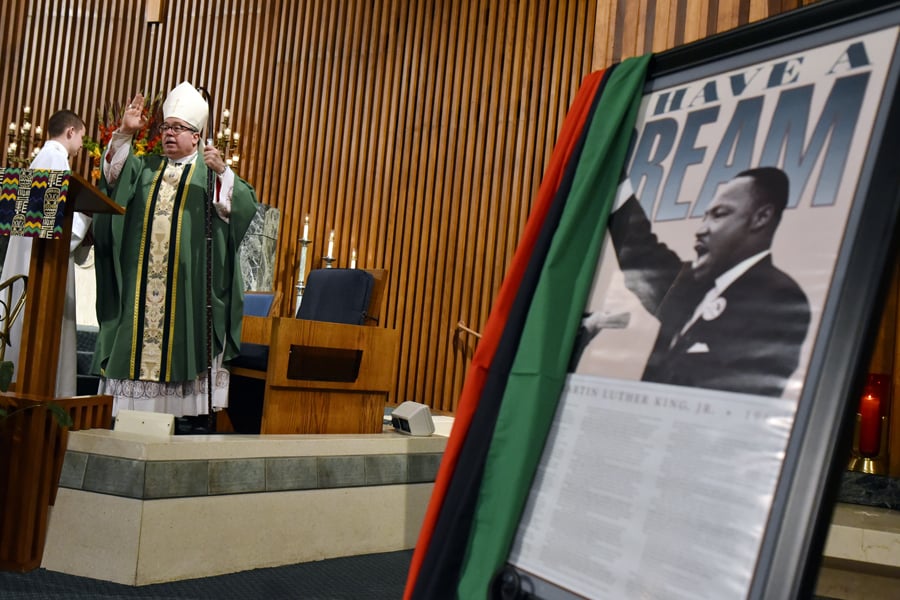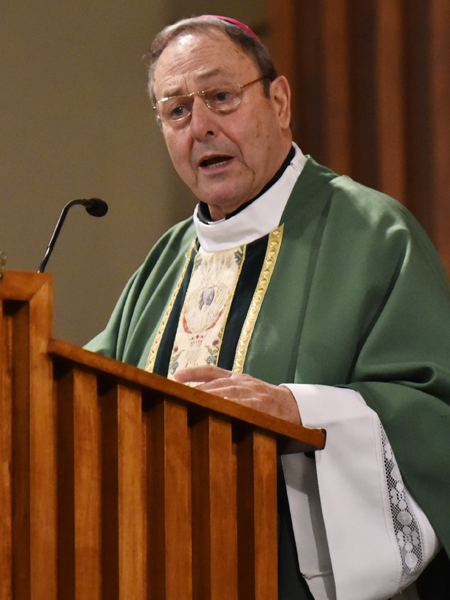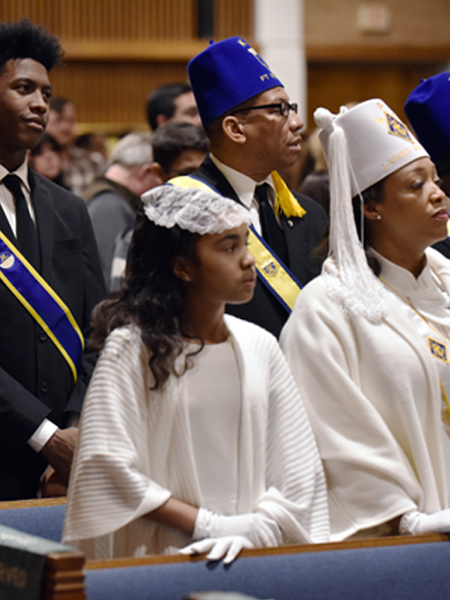Bishops, parishioners revisit Dr. Martin Luther King Jr.’s legacy at 50 years

Bishop Michael Olson conducts a final blessing at the closing of the 32nd annual Dr. Martin Luther King Jr. Memorial Mass, Saturday, Jan. 13 at St. Maria Goretti Church in Arlington. (NTC Photo/Ben Torres)
ARLINGTON — April 4 marks the 50th anniversary of Dr. Martin Luther King, Jr.’s assassination, a milestone on the minds of those who attended the 32nd annual Dr. King Memorial Mass at St. Maria Goretti Parish in Arlington as they reflected on what has been accomplished and what remains to be done.
King’s legacy, Bishop Michael Olson said at the Jan. 13 liturgy, must be remembered not as an ember of history but as a spark of hope and inspiration of good works.
Though King was Baptist, his message crosses religious denomination lines, Bishop Olson said.
“Celebrating his memorial Mass brings us in solidarity with people of other faiths and goodwill,” Bishop Olson said. “And gives us the chance to look at our own social teachings of the Church while participating in the broader interfaith society.
“It’s also a reminder of the many Catholics who dedicated themselves for racial justice — often at great risks to their lives.”
King’s message rings as true now as it did in 1968, Bishop Olson said.
“We all have a social responsibility to stand for the dignity of each and every person and to stand against racism,” the bishop said. “Especially in this day and age when so many voices in government seem to forget that responsibility.”
Bishop Robert Guglielmone of the Diocese of Charleston, SC, concelebrated the memorial Mass with Bishop Olson. He reflected on the horror of the June 17, 2015 shooting at Charleston’s Mother Emanuel AME Church that left nine dead but also the “tremendous inspiration” as the community came together.

“What happened that night at this historic church opened a deep wound of racism that continues to permeate the South and indeed is still a part of American society,” Bishop Guglielmone said.
Despite bomb threats, community members gathered for a vigil several days later.
“Thousands of every race and background attended,” Bishop Guglielmone said. “Clergy, local and state officials, and various community representatives expressed the grief everyone was experiencing. But in our broken hearts we realized we loved each other.”
Many, Bishop Guglielmone joked, refer to Charleston as the holy city based on its number of churches per square mile but more so it’s the faith level of the city’s people.
“Nowhere was this reality more evident than in the unbelievable expressions of forgiveness,” Bishop Guglielmone said. “Often to the assailant, Dylann Roof, by survivors, relatives, and friends of those slain. This was certainly not easy for those who offered words of forgiveness.”
The faith of the community confounded Roof’s hopes of sparking a racial war, Bishop Guglielmone said.
“What has resulted is exactly the opposite of what was anticipated by this deranged and hateful young man,” Bishop Guglielmone said. “Charleston showed the world how to react to violence. How to be steadfast in the faith that so permeated this community.”
Now it falls to us to overcome the underlying issues that contribute to racism and the horrors of incidents such as Charleston, Bishop Guglielmone said.
“We still have a long way to go to realize the harmony to which we are called as a human family,” Bishop Guglielmone said. “First the sin of racism itself and its effects and what it is we as Christians are called to in order that we may effectively combat this evil.”
We must realize that racism exists in a variety of forms and that there is something we can do about it.
“First and foremost, no big surprise, prayer,” Bishop Guglielmone said. “Prayer for peace in our communities is absolutely essential.”
Dialogue and encounters with members of other groups within the community is also essential, Bishop Guglielmone said, as is the need for all to come to an understanding of their own prejudices. Education is also vital given that the lack of education contributes to the root causes of racial tension.
“As Christians we are called to see everyone as brothers and sisters in the Lord,” Bishop Guglielmone said.
King, he said, led America to a new way of relating to one another and raised consciousness by encouraging nonviolence.
“Our challenge is to work for that dream,” Bishop Guglielmone said.

So impressed with Bishop Guglielmone’s homily was Our Mother of Mercy parishioner Dorothea Lee-Menefee that she suggested it should be passed along to every parish in the diocese. She especially appreciated the “A-ha” for people to examine their own hearts to determine whether racism is present.
“If you segregate yourself and keep others from coming in then yes, you’re racist,” Lee-Menefee said. Much remains to be done, but hope endures, Lee-Menefee said.
“There is hope that we can grab hold of the truth,” Lee-Menefee said. “Because as long as you’ve got hold of the truth and keep Jesus up here nothing else matters.”
St. Maria Goretti parishioner Peter Ayana, 62, said the presence of division and racism still surprises him.
“But I’m very hopeful,” Ayana said. “My recent discovery has been that the younger ones are more open, more progressive than the older ones. So that gives me hope for the future.”
Verna Amao of St. Joseph Parish in Arlington, though born after King’s assassination, said his message should not be relegated to dusty history books.
“It’s important we keep implementing and finding common ground and practical solutions about the real problems of the world,” Amao said. “That’s one of the things I liked about the bishop’s sermon — that he offered solutions anyone can take back to their individual parishes and into their own hearts.”
Lee-Menefee and Madeline Morrison, also of Our Mother of Mercy in Fort Worth, announced the six winners of this year’s MLK Essay contest held in the diocese’s Catholic schools. The 185 students who entered wrote on what it means to be a living stone and the inspiration of Father Augustus Tolton, the first African-American priest in America. Harley Tyree of St. Peter the Apostle School in Fort Worth won the overall contest.
Living stones are those who “trust Jesus and build their lives with Him as their foundation,” Tyree wrote.
Fr. Tolton was a living stone, Tyree wrote, through his belief, trust, and ability to lean on God when things got tough.
